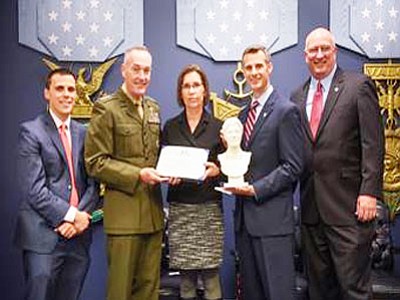BALTIMORE — A staggering share of veterans who served in Iraq and Afghanistan are returning home with mental illnesses brought on by their time overseas. Hundreds of thousands struggle with post-traumatic stress disorder and need help.
Dr. Barbara Van Dahlen founded Give An Hour, a Bethesda-based nonprofit organization in 2005 because her mission to meet the needs of this population is personal.
“My uncle served in Vietnam, my nephew is currently serving in the Navy and my dad served in World War II and I know the struggles,” said Van Dahlen.
Last month, Give An Hour’s mission was honored by the Newman’s Own Foundation with a $50,000 grant to continue blaze it’s mission forward. The honor stems from an annual competition by Newman’s Own, the company of famed actor Paul Newman, to reward ingenuity for programs that benefit service men and women and their families.
According to the foundation’s website, Newman’s Own Foundation is an independent, private foundation formed in 2005 by Paul Newman to sustain the legacy of his philanthropic work. Funded entirely through the profits and royalties from Newman’s Own products, the Foundation does not maintain an endowment, raise funds, or accept donations. The Foundation believes that each of us, through the power of philanthropy, has the potential to make a difference.
“My dad passed away in 1986 and he was a wonderful and strong man who came home with some of the invisible issues of war,” Van Dahlen said. “My dad had three young kids and he wanted to move this young family out of Los Angeles and into the country. By moving, my mom, who was later diagnosed with a severe mental illness, my dad had to step in and raise all of us and it had a profound impact and we realized that we needed to find a better way to take care of people who find themselves in situations like this through no fault of their own.”
Give an Hour is a part of a network of therapists and other mental health professionals who donate their time to meet the mental health needs of the service men and women and their families affected by the post-9/11 conflicts. To date, more than 200,000 hours of care and support has provided to those in need.
“We literally can’t do our work without those who volunteer their time and skills. I’m a clinical psychologist and I didn’t know anything about starting and running a nonprofit [organization], but I was compelled to start this and I literally had to read ‘Nonprofit for Dummies’ and I realized how much nonprofits depend on the generosity of foundations and corporations,” Van Dahlen said.
“We depend on recognitions like Newman’s Own because it’s like getting the Good Housekeeping seal of approval,” she said. “When Newman’s Own says you’re doing good work, that is very important.”
Currently, Give an Hour provides counseling to individuals, couples and families, and children and adolescents. Through its network of professionals, services for anxiety, depression, substance abuse, post-traumatic stress disorder, traumatic brain injuries, sexual health and intimacy concerns, loss and grieving and other challenges are provided.
“Our providers are working also to reduce the stigma associated with mental health by participating in and leading education, training, and outreach efforts in schools and communities and around military bases,” Van Dahlen said.
As of June, the nonprofit’s network of licensed mental health professionals includes nearly 7,000 psychologists, social workers, psychiatrists, marriage and family therapists, drug and alcohol counselors, pastoral counselors, and other professional counselors. This does not include the alternative providers on our list who have also donated their time, Van Dehlen said.
“We’ll continue to build services. People think that the war is over but we still have to continue to provide care,” Van Dahlen said. “We are working with international partners too; and we’re going after a culture change in a major way. We all know the signs of a heart attack, but our work is focused on identifying the signs of emotional suffering.”
